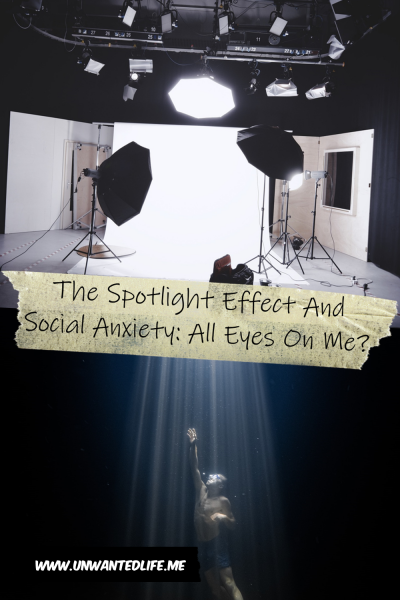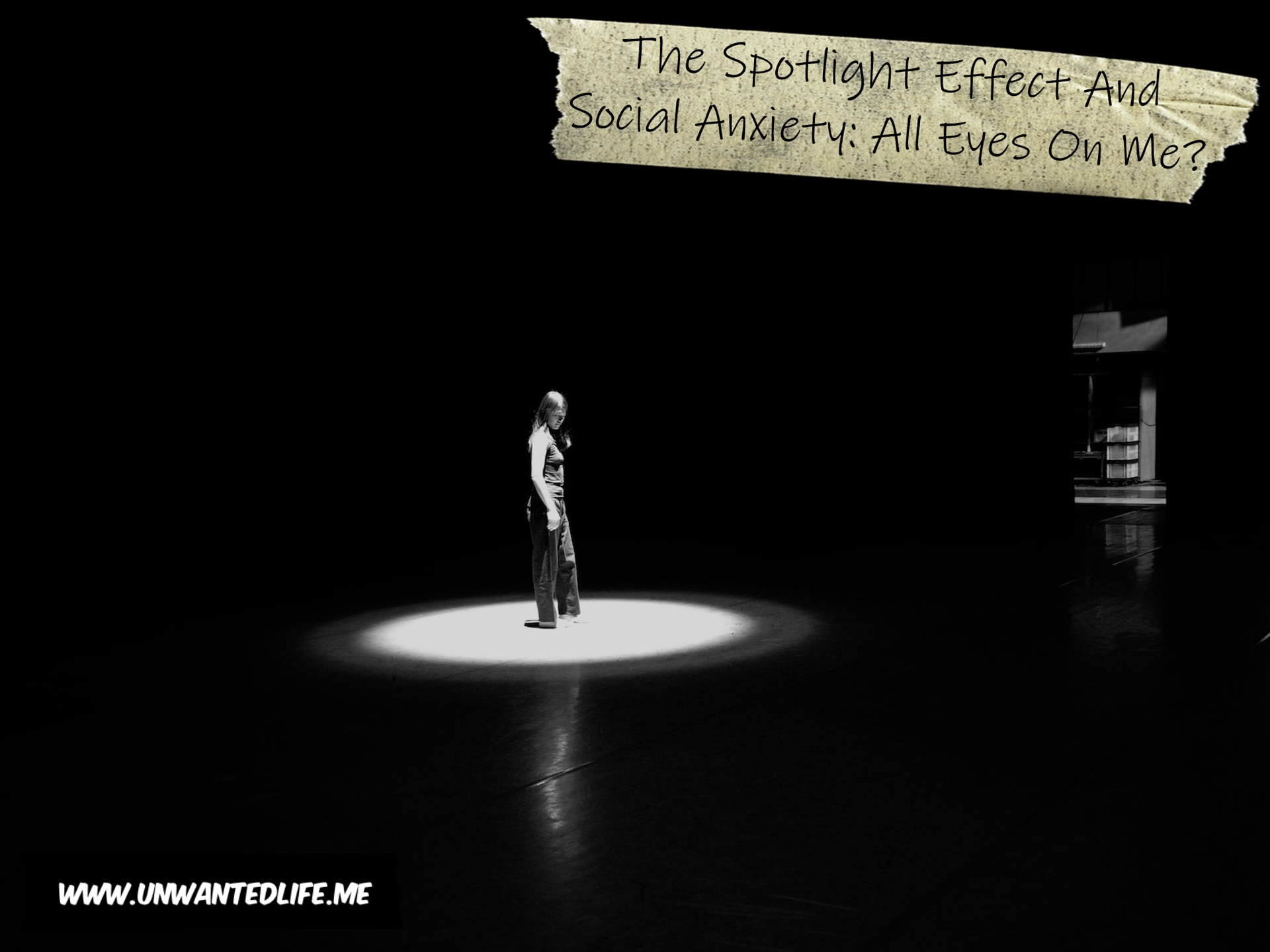When it comes to social anxiety disorder, the spotlight effect is often a factor, a very powerful factor. It can ruin your life if you let it. I know it did for me. But what if I said that the spotlight has never been on you and that you’re just holding a torch under your face like you’re about to tell a ghost story at a sleepover? Keep reading to find out more.
What Is The Spotlight Effect?
From our own perspective, we’re the protagonist in our own story, with everything revolving around us (Bernique, 2020). And that’s hardly surprising because we can only interact with the universe from our own perspective. There was also a time during our development when we didn’t have object permanence, which meant, from our perspective, things stopped existing when we could no longer see or sense them. That’s why peekaboo works with babies. For the first two years of life, we basically think we’re the only permanent thing in existence.
The Spotlight Effect And Anxiety
Most people can live their lives normally even if they still have the mentality that they’re the star of their own movie and everyone else are just extras. But for others, myself included, the spotlight effects can cause people to overestimate how much other people pay attention to them and their appearance (Brown and Stopa, 2007).
Because I grew up experiencing a lengthy period of racist abuse, I was forced to believe that the spotlight shined brightest on me. Although it was less a belief at the time and very much a fact. Being Black in a White space as a child in the 80s and 90s meant people would turn their focus on me to make my life miserable. It’s of little wonder that I developed agoraphobia and social anxiety.
Everyone has likely experienced the fear of being judged for an embarrassing mishap (Epley, Savitsky, and Gilovich, 2002). If you’re British, then you’ll know you’ll often hear a cheer when someone drops a glass or two in a pub. But I bet you can’t remember who the hell it was that did it if you tried to remember unless it was you who dropped them.
But for people with social anxiety disorder, this fear of embarrassment can take on a life of its own. People with this, and similar disorders, can become laser-focused on self-focused attention to avoid such negative evaluations by others (Brown and Stopa, 2007). Because of the spotlight effect, we can become locked into a closed system of social anxiety where our self-focused attention sustains our anxiety and anything external that could disprove our fears is rejected or not available to us.

For me, my anxiety disorders and my drug-induced psychosis caused me to develop a couple of irrational fears. The worst by far was that I would lose bladder and bowel control in public. It didn’t matter that it had never happened to me since being a literal baby. That was my fear. And the other one was that I’d have disgusting spots on my face and everyone would be disgusted with me. And when these anxiety-inducing fears get out of control, I’d have a psychotic episode. Fun.
My fears weren’t justified, but because of the spotlight effect, they dominated my life. That’s because the spotlight effect can cause egocentric bias that leads us to believe that other people will notice both the good and bad things about us (Bernique, 2020). This is exactly why laughter and whispering are a trigger for me because I have it in my head that they’re whispering and laughing about me when the reality is, it’s very unlikely to be about me.
The truth is that most people won’t notice the good or the bad things about us, because we’re largely invisible in other people’s stories (Psychology Today). This can be both a bad thing or a good thing, depending on how you want to look at it. But this is why people might not notice that you’ve changed something about yourself and were hoping someone would notice.
At the same time, this is why the random people we meet won’t remember us if we did something we think was embarrassing or that was actually embarrassing. They may remember the embarrassing thing, but not that it was us that did it because we’re just some random person their brain will forget.
There’s also the fact that people aren’t as harsh as our self-criticism tells us they will be. So if we do something that is embarrassing, most people will empathise with our embarrassing mishap and moderate their judgements accordingly (Epley, Savitsky, and Gilovich, 2002). It might not seem like it, because of how the spotlight effect can have us twisted up, but that’s the reality. They’ll either empathise with us or not even see us in the first place.
There’s a really great example of just how much we can miss around us that truly shows how little the spotlight is really on us, and that’s ‘The Monkey Business Illusion’. Check it out below.
As the above YouTube video shows, we are all subject to what is known as change blindness. We can see change happen before our eyes but have no idea that it actually happened (Psychology Today).
Turning The Spotlight Off
When it comes to social anxiety, graded exposure, interoceptive exposure, imagined exposure, and therapy are great places to start. But a simple thing you can start doing today is accepting that you’re only the star in your story. It may sound a little nihilistic, but we’re invisible to pretty much everyone who doesn’t know us, but that’s not a bad thing.
In fact, that should be seen as being freeing. You’re free to make mistakes and pursue the goals you want without fear of judgment because you’re just filler in the majority of people’s stories. So eat the cake, ask for that raise, buy that outfit, and go for that promotion.
Just to be clear, you may not register in the stories of the people who barely know you or don’t know you at all, but that doesn’t mean you don’t matter. You do matter. You’re the only person that can live and tell your story, so make sure it’s one you’re happy with.
Summary
We may be the star in our own movie, but to 99.9…% of the world, we’re nothing but background filler. And that’s how it should be. If the spotlight was real, our lives would truly be hell on earth. What’s more, the majority of things that we think our embarrassing aren’t in fact embarrassing, they’re just things that happen that have little to no meaning, until the spotlight effect causes us to think that it’s embarrassing.
No one thinks about you as much as you think about yourself, and that is the same for every one of us.
As always, leave your feedback in the comments section below. Also, please share your experiences with the spotlight effect and social anxiety in the comments section below as well. Don’t forget, if you want to stay up-to-date with my blog, then sign up for my newsletter below. Alternatively, get push notifications for new articles by clicking the red bell icon in the bottom right corner.
Lastly, if you’d like to support my blog, you can make a donation of any size below. Until next time, Unwanted Life readers.
References
Bernique, A. S. (2020). Lights, Camera, Anxiety: The Spotlight Effect, Social Anxiety and the Perception of Gaze Direction. Undergraduate Review, 15(1), 21-37. Retrieved from https://vc.bridgew.edu/cgi/viewcontent.cgi?article=1460&context=undergrad_rev.
Brown, M. A., & Stopa, L. (2007). The spotlight effect and the illusion of transparency in social anxiety. Journal of anxiety disorders, 21(6), 804-819. Retrieved from https://eprints.soton.ac.uk/45092/1/SE_and_IOT.pdf.
Epley, N., Savitsky, K., & Gilovich, T. (2002). Empathy neglect: Reconciling the spotlight effect and the correspondence bias. Journal of personality and Social Psychology, 83(2), 300. Retrieved from https://citeseerx.ist.psu.edu/document?repid=rep1&type=pdf&doi=9d4feb327ab5a71df880644ac1c7963c9e494b2a.


I haven’t heard of this effect before but I understand how it can impact your life. It is still so crazy to me the fact that how we could all perceive the same thing in different ways. I like to think of this in the sense that I am in charge of my happiness, rather than any other way if that makes sense. Thank you for sharing this and your experience.
Lauren
Thanks for sharing your thoughts
I’m sorry you grew with abusive past. I didn’t know this much about this kind of effect. So, it’s interesting and love how to share the information.
Thanks for commenting
I only had very little idea about it. I have read about it superficially. Thanks for providing this topic in detail.
Thanks for commenting
“You’re the only person that can live and tell your story, so make sure it’s one you’re happy with.” I love this sentence. I used to be so self-conscious and I think that’s what has held me back.
Same
I used to hate the idea of public speaking & this spot light effect. But I’ve luckily managed to work through it…
Thanks for commenting
I agree we can feel like everyone is looking at us. This is a very informative post.
Thanks for commenting
This is so true and, as you say, freeing. I have a course on being the hero of your story, and putting your own health and wellbeing before anyone else. While it may appear selfish, if we all took responsibility for ourselves we can make our lives happier. Shakespeare wrote it, all the worlds a stage and we are merely players. It is also in Hermeticism and Stoicism. We are the core to our story and yet it is very hard to do. Very interesting and thought-provoking article, thank you as always. Your experience and your learnings are helping many people.
Although we are all the stars of our own stories, this is more about the neurotic side of that and how harmful it can be, causing anxiety. Accepting that we’re not the stars of other people’s stories (lives) is where we can feel free. We judge ourselves too harshly while we’re pretty invisible to people who don’t know us
For me, being able to understand what is happening to you is a huge step in being able to do something about it. Your posts are always great in defining, explaining, and giving helpful tools for each mental health topic. Thanks for sharing your story and this post.
Thank you for commenting
This is exactly what I tell myself if I worry about feeling awkward in a social situation. ‘No one thinks about you as much as you think about yourself.’ I’ve read several studies to that effect but I appreciate you sharing this proven psychological phenomenon with us. Thanks!
It’s a hard thing to accept when we’re the centre of our own world, be freeing when you can. Thanks for commenting
As a fellow anxiety sufferer I can definitely identify with this. I used to have a stutter as a child which affected by self confidence. I’ve learned to control it with time but I still hate making speeches in public.
I can’t imagine what it would have been like growing up with a stutter, but I’m glad things have improved a lot since then
Yes, once I learned to control my anxiety the stutter disappeared
That’s awesome